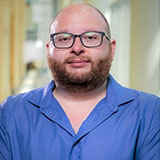Translational Research Scholars 2024
The School of Medicine’s Program to Advance Physician Scientists and Translational Research (TRSP) has selected its 2024 Translational Research Scholars. We are pleased to announce that five outstanding junior faculty from across the School of Medicine have been selected from a large number of highly competitive applications. The TRSP award includes funds to support the scholars’ innovative translational research as well as ongoing mentorship and career development throughout the award period. The program aims to foster translational research among the school’s early career faculty, allowing them to expand the scope of their research into new lines of exploration.
The TRSP is led by David Schwartz, MD, Distinguished Professor of Medicine and Immunology and Director of the School of Medicine Program to Advance Physician Scientists and Translational Research, and Sean Colgan, PhD, Levine-Kern Professor of Medicine and Immunology in the Division of Gastroenterology. In its third year, the Program now supports a total of 23 Scholars from seven departments in the School of Medicine.
The TRSP awards will provide each Scholar with up to $300,000 for their research over the four-year award. The Program’s next call for applications will be in the fall of 2024. The Program is open to early career faculty from across the School of Medicine who are within the first four years of their assistant professor appointment.
2024 Translational Research Scholars

Yoni Ashar, PhD
Assistant Professor
Department of Medicine, Division of Internal Medicine
Dr. Ashar is an assistant professor at the University of Colorado Anschutz Medical Campus. He completed his doctorate in clinical psychology and neuroscience at the University of Colorado Boulder and an NIH-funded postdoctoral fellowship at Weill Cornell Medicine. Dr. Ashar directs a research laboratory using functional MRI brain imaging, natural language processing, and other clinical and computational tools to understand how mind and brain processes influence health, especially chronic pain. His research focuses on investigating a new class of psychological and neuroscience-based treatments aiming for recovery from chronic pain. Dr. Ashar’s TRSP-funded project will focus on developing brain biomarkers and new treatments for chronic pain.

Martin Breuss, PhD
Assistant Professor
Department of Pediatrics, Section of Clinical Genetics and Metabolism
Dr. Breuss is an assistant professor in the Department of Pediatrics in the Section of Genetics and Metabolism and a 2022 Boettcher Investigator. Prior to starting his independent laboratory in 2021, he received his PhD in Molecular Biology from the University of Vienna, Institute of Molecular Pathology, followed by a postdoctoral fellowship at the University of California, San Diego. His laboratory’s research is focused on the origin, impact, and utility of genomic mosaicism—the phenomenon where some but not all cells within a tissue carry a unique genetic mutation. Their work includes the development of experimental and analytical methods for its detection and their implementation to understand development, homeostasis, and disease. For the TRSP-funded project, Dr. Breuss and his team will employ genomic mosaicism detection frameworks to understand the clonality of the hematopoietic system and its correlation with aging and disease—leveraging the data resources available through the Colorado Center of Precision Medicine (CCPM).

Joanne Cole, PhD
Assistant Professor
Department of Biomedical Informatics
Dr. Cole is a complex trait human geneticist and an Assistant Professor in the Department of Biomedical Informatics at the University of Colorado School of Medicine. Her research focuses on using large-scale genomics as a tool to elucidate diet’s role in the body and human health, with a focus on cardiometabolic disease. Dr. Cole received her PhD in 2016 in the Human Medical Genetics and Genomics Program at CU, studying the genetic determinants of normal human facial shape and body size in children and adolescents from Tanzania. She conducted her postdoctoral training on the genetics of diabetic kidney disease as a lead analyst in the ‘Genetics of Nephropathy – an International Effort’ (GENIE) consortium at the Broad Institute of MIT and Harvard, Massachusetts General Hospital, and Boston Children’s Hospital. In 2019 she became an Instructor at Harvard Medical School and built her independent research program (funded by the American Diabetes Association and an NIDDK K99/R00 Award) on the biological basis of dietary intake, which she has been expanding at CU since 2022.

Janani Ravi, PhD
Assistant Professor
Department of Biomedical Informatics
Dr. Ravi is an assistant professor in the Department of Biomedical Informatics with ties to the Departments of Immunology and Microbiology. She completed her PhD in Computational Biology at Virginia Tech, postdoctoral research at the Rutgers Public Health Research Institute, and started her research group at Michigan State University prior to moving to CU in late 2022. Dr. Ravi’s research group (JRaviLab, jravilab.github.io) develops general-purpose computational approaches that integrate large-scale heterogeneous public datasets for mechanistic understanding of microbial genotypes, phenotypes, and diseases. The JRaviLab asks: How do we link (microbial) pathogen genotypes to phenotypes? How can host responses to infection inform disease mechanisms and therapeutics? Her group provides open data/software and easy-to-use web applications for biomedical researchers, and the methods are developed to be pathogen- and disease-agnostic. Dr. Ravi is currently supported by an NIH NIAID U01 (antimicrobial resistance prediction) and R21 (host responses, host-directed therapeutics), two CU CPMR-DBMI dyads (bone health, implant corrosion), and an NIH NLM T15 supporting her postdoc. Dr. Ravi is engaged and committed to mentoring/training, education, and outreach, and creating and sustaining diversity and inclusivity in data science for learners and professionals alike, focused on increasing the participation of underrepresented minorities in the field. She founded R-Ladies East Lansing and R-Ladies Aurora, and co-founded Women+ Data Science and AsiaR. She also co-chairs the R/Bioconductor Community Advisory Board.

Ronald J. Vagnozzi, PhD
Assistant Professor
Department of Medicine, Division of Cardiology
Dr. Vagnozzi is an assistant professor in the Department of Medicine in the Division of Cardiology. He completed his PhD in Cell and Developmental Biology with Dr. Thomas Force at Thomas Jefferson University, focusing on novel protein kinase signaling pathways controlling myocyte death and cardiac remodeling. Then as a postdoctoral fellow with Dr. Jeffery Molkentin at Cincinnati Children’s Hospital and the Howard Hughes Medical Institute, he examined mechanisms of cell-based therapy for ischemic heart disease, revealing that macrophage activity is central and sufficient for the therapeutic benefit of adult cardiac stem cell-based therapies. In 2021, Dr. Vagnozzi was appointed Assistant Professor in the Division of Cardiology and the Consortium for Fibrosis Research and Translation (CFReT). The Vagnozzi lab focuses on cellular mechanisms of the injury and stress response in heart failure and myocardial infarction, with emphasis on the innate immune system and fibrotic wound healing. The lab strives to discover new signaling mechanisms that can resolve chronic inflammation and fibrosis, in order to therapeutically harness beneficial functions of immune cells in non-regenerative organs like the heart. Dr. Vagnozzi is funded by an R01 from the NIH/NHLBI.
Contact Us
David Schwartz, MD
Program Director
[email protected]
Jennifer Kemp, PhD
Associate Program Director
[email protected]
Sarah Miller
Business Coordinator
[email protected]